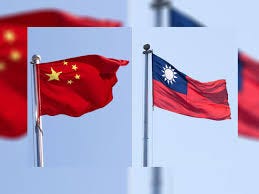In the diplomat, Hung Tran, a nonresident senior fellow at the Atlantic Council, a former executive managing director at the Institute of International Finance, and former deputy director at the International Monetary Fund, gave an optimistic presentation on The Prospects for a Recalibration of China’s Taiwan Policy whereby with focus toward Taiwan’s next presidential election in January 2024, China appears poised to adjust its Taiwan policy, especially if the Taiwan’s KMT (Kuomintang) is victorious.
SUMMARY
1. China intention on unification with Taiwan, either peacefully or by force if necessary; Taiwan intent on preserving its de facto independence; and the U.S. supporting Taiwan by trying to deter China from taking unilateral actions to change the status quo.
2. Since the 20th National Congress of the Communist Party China (CPC), there are signs that China is fine-tuning her approach to, and even a new narrative, on the goal of unification with Taiwan.
The clearest sign of China’s rethinking its Taiwan policy has been the important part Wang Huning, China’s premier political strategist, who has advised three generations of CPC top leaders, has recently played in Taiwan affairs.
3. The Kuomintang (KMT), Taiwan’s opposition party, is having dialogue with Beijing to normalize contacts between the two peoples, (KMT Vice Chairman Andrew Hsia Li-yan has visited mainland China twice in the past six months, and met with Chinese officials in charge of Taiwan affairs).
4. Wang Huning, chosen as the fourth-ranked leader in the CPC ruling body - the Politburo Standing Committee - is slated to become deputy chairman of the CPC Central Leading Group on Taiwan Affairs, the top authority on Taiwan policy headed by Xi Jinping himself. More specifically, he has reportedly been charged by Xi to develop a new political framework, or narrative, for the unification of Taiwan.
5. The roadmap to unification is specified in China’s 2005 Anti-secession Law: “…when possibilities for a peaceful reunification should be completely exhausted, the State shall employ non-peaceful means and other necessary measures to protect China’s sovereignty and territorial integrity.”
6. However, KMT has stated that the “one country, two systems” model is not suitable for Taiwan and had focused instead on its ability to maintain dialogue with Beijing to reduce cross-Strait tension and improve contacts and livelihoods of the two peoples.
7. This approach appeals to Taiwanese as most do not want to be “unified” with China but also do not want escalating tension, let alone war with China.
8. Crucially, the next 10 months, shall see if China’s calibration of her Taiwan policy shows any flexibility conducive to cross-Strait dialogue, especially if the KMT were to win the presidential election.
9. The dynamics of the cross-Strait relationship are changing, and many factors are contributing positively the U.S. and China a capacity to manage their strategic competition.
A new geostrategic direction shall thereby contain tension - and avoid any likely conflict - over the Taiwan Strait.
RELATED READINGS
Destined for War




